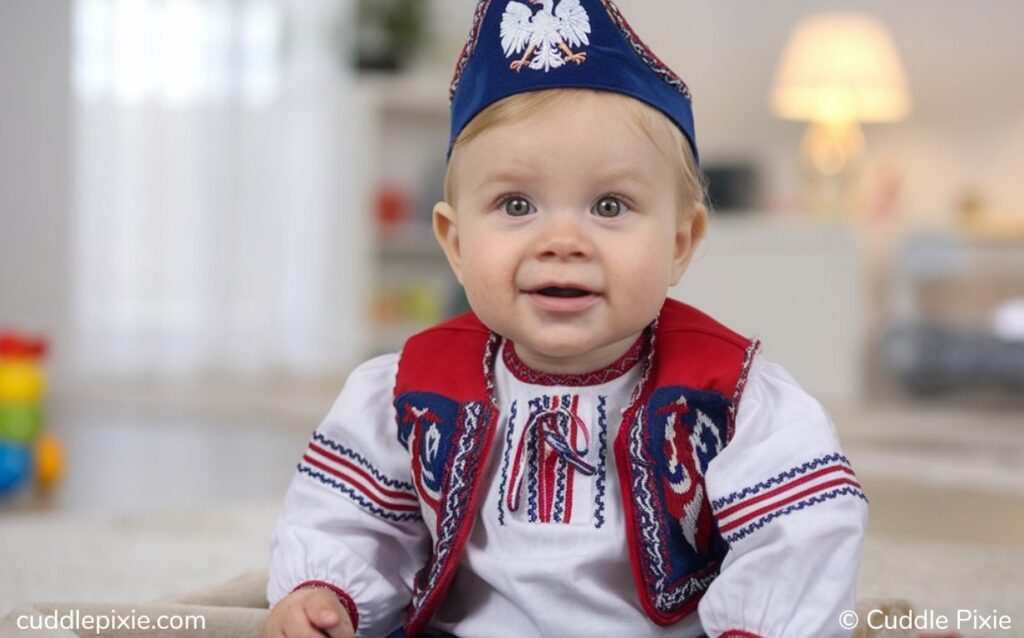Updated on 23 August 2024 by Zohaib Sunesara
In Poland, naming a baby is more than just choosing a label; it’s a reflection of heritage, culture, and tradition. Polish baby names carry centuries of history, blending Slavic roots with influences from Latin, Greek, and other languages. Let’s delve into the fascinating world of Polish baby names to uncover their meanings, origins, and cultural significance.
Polish naming traditions are deeply rooted in history. Throughout the centuries, Poland has been influenced by various cultures and languages, resulting in a rich tapestry of names. Slavic elements form the foundation, while Latin, Greek, and Germanic influences add depth and diversity to Polish names. Names often reflect religious beliefs, with many derived from saints and biblical figures.
In This Article
Polish Baby Boy Names
Polish parents have a wealth of beautiful names to choose from for their little ones. From timeless classics like Anna and Jan to more modern choices like Katarzyna and Mateusz, Polish baby names offer a blend of tradition and innovation. Each name carries its own unique meaning and origin, adding depth and significance to the naming process.

- Adam – Meaning “man” or “to be red” in Hebrew, it’s of biblical origin.
- Adrian – Of Latin origin, meaning “from Adria” or “dark one”.
- Albert – Derived from the Old High German name Adalbert, meaning “noble” or “bright”.
- Aleksander – A form of Alexander, meaning “defender of the people” in Greek.
- Andrzej – The Polish form of Andrew, meaning “manly” or “brave” in Greek.
- Antoni – A variation of Anthony, meaning “priceless” or “highly praiseworthy” in Latin.
- Artur – Of Celtic origin, meaning “bear-man” or “noble one”.
- Bartłomiej – The Polish form of Bartholomew, meaning “son of Tolmai” in Aramaic.
- Błażej – A Polish name derived from the Latin word “blaseus”, meaning “to lisp” or “to stammer”.
- Cezary – Of Latin origin, derived from the name Caesar, meaning “long-haired” or “head of hair”.
- Daniel – A biblical name meaning “God is my judge” in Hebrew.
- Damian – Of Greek origin, meaning “to tame” or “subdue”.
- Dominik – Derived from the Latin name Dominicus, meaning “belonging to the Lord” or “of the master”.
- Edward – Of Old English origin, meaning “wealthy guardian” or “rich guard”.
- Emil – From the Roman family name Aemilius, meaning “rival” or “emulating”.
- Filip – The Polish form of Philip, meaning “lover of horses” in Greek.
- Grzegorz – The Polish form of Gregory, meaning “watchful” or “vigilant” in Greek.
- Hubert – Of Germanic origin, meaning “bright heart” or “spirit”.
- Ignacy – Derived from the Latin name Ignatius, meaning “fiery” or “ardent”.
- Ireneusz – A combination of the Greek words “eirene” meaning “peace” and “aner” meaning “man”.
- Jakub – The Polish form of Jacob, meaning “supplanter” or “holder of the heel” in Hebrew.
- Jan – A Polish variation of John, meaning “God is gracious” in Hebrew.
- Jerzy – The Polish form of George, meaning “farmer” or “earthworker” in Greek.
- Julian – Of Latin origin, meaning “youthful” or “downy-bearded”.
- Kacper – The Polish form of Casper, derived from Gaspar, meaning “treasurer” in Persian.
- Karol – A Polish form of Charles, meaning “free man” or “manly” in Germanic.
- Kornel – Derived from the Latin name Cornelius, meaning “horn” or “horned”.
- Krzysztof – The Polish form of Christopher, meaning “bearing Christ” or “Christ-bearer”.
- Łukasz – A Polish form of Lucas, meaning “light-giving” or “from Lucania” in Latin.
- Marcel – Of Latin origin, meaning “warlike” or “dedicated to Mars”.
- Marek – The Polish form of Mark, meaning “warlike” or “dedicated to Mars” in Latin.
- Marcin – A variation of Martin, meaning “of Mars” or “warlike” in Latin.
- Mateusz – The Polish form of Matthew, meaning “gift of Yahweh” in Hebrew.
- Michał – A Polish form of Michael, meaning “who is like God?” in Hebrew.
- Mikołaj – The Polish form of Nicholas, meaning “victory of the people” in Greek.
- Oskar – Of Old Norse origin, meaning “divine spear” or “God’s spear”.
- Patryk – The Polish form of Patrick, derived from the Latin name Patricius, meaning “nobleman” or “patrician”.
- Piotr – The Polish form of Peter, meaning “rock” or “stone” in Greek.
- Rafał – Of Hebrew origin, meaning “God has healed” or “God’s healer”.
- Remigiusz – Derived from the Latin name Remigius, meaning “oarsman” or “rower”.
- Robert – Of Old German origin, meaning “bright fame” or “famed” and “bright”.
- Ryszard – The Polish form of Richard, meaning “brave power” or “strong ruler”.
- Sebastian – Of Greek origin, meaning “revered” or “venerable”.
- Sławomir – Derived from the Slavic elements “slava” meaning “glory” and “mir” meaning “peace”.
- Stanisław – Of Slavic origin, meaning “camp glory” or “camp strength”.
- Szymon – The Polish form of Simon, meaning “he has heard” in Hebrew.
- Tomasz – A Polish form of Thomas, meaning “twin” in Aramaic.
- Tymoteusz – A Polish form of Timothy, meaning “honoring God” or “to honor God” in Greek.
- Wiktor – The Polish form of Victor, meaning “conqueror” or “victory” in Latin.
- Władysław – Of Slavic origin, meaning “rule with glory” or “to own glory”.
- Wojciech – Derived from the Slavic elements “voji” meaning “soldier” and “tech” meaning “comfort” or “joy”.
- Zbigniew – Of Slavic origin, meaning “to dispel anger” or “to extinguish fury”.
- Zenon – Derived from the Greek name Zenon, meaning “guest” or “stranger”.
- Zygmunt – Of Germanic origin, meaning “victory protection” or “victorious hand”.
- Adrian – From Latin, “man of Adria.”
- Albert – From Germanic, “noble, bright.”
- Bartosz – A combination of Bartłomiej and Bożena.
- Cezary – From Latin, “long-haired.”
- Dobromir – From Slavic, “good peace.”
- Feliks – From Latin, “lucky, successful.”
These names cover a range of meanings and origins, providing a diverse selection for parents looking for a Polish baby boy name.
Polish Baby Girl Names
Naming a baby in Poland is a time-honored tradition filled with meaning and symbolism. Family names are often passed down through generations, connecting children to their ancestors and heritage. Many Polish families also honor saints’ feast days by naming their children after them, believing it brings blessings and protection.

- Ada – Of Germanic origin, meaning “noble” or “nobility”.
- Agata – The Polish form of Agatha, meaning “good” or “kind” in Greek.
- Aleksandra – A feminine form of Alexander, meaning “defender of the people” in Greek.
- Alicja – The Polish form of Alice, meaning “noble” or “of noble birth” in Old German.
- Amelia – Derived from the Germanic name Amalia, meaning “work” or “industrious”.
- Anastazja – The Polish form of Anastasia, meaning “resurrection” or “to rise again” in Greek.
- Angelika – Of Greek origin, meaning “angelic” or “like an angel”.
- Anna – A classic name of Hebrew origin, meaning “grace” or “favor”.
- Antonina – Feminine form of Antonius, meaning “priceless” or “highly praiseworthy” in Latin.
- Barbara – Of Greek origin, meaning “foreign” or “strange”.
- Beata – Derived from Latin, meaning “blessed” or “happy”.
- Bogna – Of Slavic origin, derived from the word “bog” meaning “god”.
- Bożena – Derived from Slavic elements, meaning “divine” or “god’s gift”.
- Dagmara – Of Slavic origin, meaning “peace of the day” or “day’s peace”.
- Dominika – Feminine form of Dominik, meaning “belonging to the Lord” or “of the master”.
- Dorota – The Polish form of Dorothy, meaning “gift of God” in Greek.
- Edyta – A Polish variation of Edith, meaning “riches” or “blessed”.
- Eliza – A diminutive of Elizabeth, meaning “God is my oath” in Hebrew.
- Emilia – A variant of Amelia, meaning “rival” or “industrious” in Latin.
- Ewa – The Polish form of Eva or Eve, meaning “life” or “living one” in Hebrew.
- Gabriela – The Polish form of Gabrielle, meaning “God is my strength” in Hebrew.
- Helena – Of Greek origin, meaning “bright” or “shining one”.
- Irena – Derived from the Greek word “eirene”, meaning “peace”.
- Izabela – The Polish form of Isabella, meaning “God is my oath” in Hebrew.
- Jagoda – Derived from the Slavic word for “berry”, symbolizing sweetness or innocence.
- Jolanta – Of Hungarian origin, meaning “violet flower”.
- Joanna – A biblical name meaning “God is gracious” in Hebrew.
- Julia – Derived from the Roman family name Julius, possibly meaning “youthful” or “downy-bearded”.
- Justyna – The Polish form of Justine, meaning “fair” or “upright” in Latin.
- Kamila – Of Arabic origin, meaning “perfect” or “complete”.
- Karolina – A feminine form of Karl or Charles, meaning “free man” or “strong”.
- Katarzyna – The Polish form of Katherine, meaning “pure” or “unsullied” in Greek.
- Kinga – Of Hungarian origin, possibly meaning “brave” or “warrior woman”.
- Klaudia – A variation of Claudia, meaning “lame” or “disabled” in Latin.
- Krystyna – The Polish form of Christina, meaning “follower of Christ” in Greek.
- Laura – Of Latin origin, meaning “laurel” or “victory”.
- Leokadia – Derived from the Greek name Leocadia, meaning “clear, bright” or “white, shining one”.
- Lidia – Of Greek origin, meaning “from Lydia”, an ancient region of Asia Minor.
- Lucja – The Polish form of Lucia, meaning “light” or “illumination” in Latin.
- Magdalena – Of Hebrew origin, meaning “of Magdala”, a biblical place name.
- Małgorzata – The Polish form of Margaret, meaning “pearl” in Greek.
- Maria – A classic name of Hebrew origin, meaning “sea of bitterness” or “rebelliousness”.
- Marta – The Polish form of Martha, meaning “lady” or “mistress” in Aramaic.
- Monika – Of Greek origin, meaning “advisor” or “alone”.
- Natalia – Derived from the Latin word “natalis”, meaning “birthday” or “born on Christmas Day”.
- Oliwia – The Polish form of Olivia, meaning “olive tree” in Latin.
- Patrycja – The Polish form of Patricia, meaning “noble” or “patrician” in Latin.
- Paulina – Feminine form of Paul, meaning “small” or “humble” in Latin.
- Renata – Of Latin origin, meaning “reborn” or “renewed”.
- Sabina – Derived from the Latin word “sabinus”, meaning “Sabine”, an ancient Italian tribe.
- Sandra – A short form of Alexandra, meaning “defender of mankind” in Greek.
- Sara – The Polish form of Sarah, meaning “princess” in Hebrew.
- Stanisława – Feminine form of Stanisław, meaning “camp glory” or “camp strength”.
- Sylwia – Derived from the Latin word “silva”, meaning “wood” or “forest”.
- Teresa – Of Greek origin, meaning “harvester” or “reaper”.
- Urszula – The Polish form of Ursula, meaning “little bear” in Latin.
- Wanda – Of Slavic origin, meaning “shepherdess” or “wanderer”.
- Weronika – The Polish form of Veronica, meaning “she who brings victory” in Greek.
- Zofia – The Polish form of Sophia, meaning “wisdom” in Greek.
- Żaneta – A Polish form of Jeanette, derived from John, meaning “God is gracious” in Hebrew.
These names offer a variety of meanings and origins, providing options for parents looking for a Polish baby girl name.
Rare Polish Boy Names

- Bożydar – Meaning “God’s gift,” this name has Slavic origins and combines the elements “boży” (of God) and “dar” (gift).
- Czesław – Derived from the Slavic elements “czes” (honor) and “sław” (glory), this name means “one who honors glory.”
- Dobromił – This rare name combines “dobry” (good) and “miły” (dear, nice), meaning “good and dear one.”
- Gniewomir – Composed of “gniew” (anger) and “mir” (peace, world), this name paradoxically means “one who is angry for peace.”
- Jaromir – Of Slavic origin, this name combines “jary” (fierce) and “mir” (peace, world), meaning “fierce peace.”
- Kazimierz – This name blends “kazić” (to destroy) and “mir” (peace), ironically meaning “destroyer of peace” or “one who shows peace.”
- Leszek – A diminutive form of Lech, the legendary founder of Poland, this name means “from the forest.”
- Miłosz – Derived from the Slavic element “mił” meaning “dear” or “love,” this name represents affection and grace.
- Nawojka – Though traditionally a female name, it’s sometimes used for boys and means “one who soothes warriors.”
- Olgierd – Of Lithuanian origin but used in Poland, this name means “noble spear” or “noble warrior.”
- Przemysław – Combining “prze” (through, over) and “mysleć” (to think), this name means “one who thinks ahead” or “cunning.”
- Radosław – This name blends “rad” (glad) and “sław” (glory), meaning “one who is glad for glory.”
- Sławomir – Composed of “sława” (glory) and “mir” (peace, world), this name means “famous for peace.”
- Szczepan – The Polish form of Stephen, this name means “crown” or “garland.”
- Tadeusz – Of Aramaic origin, this name means “courageous heart” and was popularized by a famous Polish epic poem.
- Wacław – The Polish form of Wenceslaus, this name means “more glory” or “greater glory.”
- Zbigniew – This name combines “zby” (to get rid of) and “gniew” (anger), meaning “one who dispels anger.”
- Ziemowit – Of Slavic origin, this name combines “ziemia” (earth, land) and “wit” (lord), meaning “lord of the land.”
- Świętopełk – This rare name combines “święty” (holy) and “pełk” (people, army), meaning “leader of a holy army.”
- Żelisław – Blending “żelis” (desire) and “sław” (glory), this uncommon name means “one who desires glory.”
Rare Polish Girl Names

- Bogna – Derived from the Slavic element “bog” meaning “God,” this name represents divine protection.
- Czesława – The feminine form of Czesław, this name means “one who honors glory” and has Slavic roots.
- Dobrosława – Combining “dobry” (good) and “sława” (glory), this name means “good glory” or “one of good fame.”
- Eulalia – Though of Greek origin, this name is used in Poland and means “well-spoken” or “sweetly speaking.”
- Fredzia – A Polish diminutive of Frieda or Freda, this name means “peaceful ruler” and has Germanic origins.
- Gaja – The Polish form of Gaia, this name means “earth” in Greek mythology.
- Halszka – A rare Polish variant of Elizabeth, this name means “God is my oath” and has Hebrew origins.
- Inga – Though of Norse origin, this name is used in Poland and means “protected by Ing” (a Norse god).
- Jagienka – A diminutive form of Agnieszka (Agnes), this name means “pure” or “holy” and has Greek roots.
- Kinga – Derived from the Old Norse name Kunigund, this name means “royal family” or “noble warrior.”
- Ludmiła – Of Slavic origin, this name combines “lud” (people) and “miła” (dear, nice), meaning “dear to the people.”
- Mirosława – The feminine form of Mirosław, this name blends “mir” (peace) and “sława” (glory), meaning “peaceful glory.”
- Natasza – The Polish form of Natasha, derived from the Russian Natalya, meaning “born on Christmas Day.”
- Ożanna – A rare Polish variant of Hosanna, this name has Hebrew origins and means “deliver us” or “save, we pray.”
- Przemysława – The feminine form of Przemysław, this name means “one who thinks ahead” or “cunning.”
- Radosława – Combining “rad” (glad) and “sława” (glory), this name means “one who is glad for glory.”
- Sławomira – The feminine form of Sławomir, this name means “famous for peace.”
- Tekla – Derived from the Greek name Thekla, this name means “glory of God.”
- Wanda – A name of uncertain origin, possibly meaning “Vendian woman” or associated with the legendary Polish princess who drowned herself rather than marry a German prince.
- Żywia – Derived from the Slavic word for “life,” this rare name represents vitality and was also the name of a Slavic goddess of life and fertility.
Polish Last Names
- Nowak – The most common Polish surname, meaning “new” and often given to newcomers in a village.
- Kowalski – Derived from “kowal” meaning blacksmith, a common profession in medieval Poland.
- Wiśniewski – Refers to someone from a place with cherry trees or named Wiśniewo.
- Wójcik – Historically denoted the son of a village administrator or mayor.
- Kowalczyk – A diminutive form of Kowalski, also relating to blacksmiths.
- Kamiński – Derived from “kamień” (stone), possibly referring to someone living near rocky terrain.
- Lewandowski – Often associated with people from Lewandów or similar place names.
- Zieliński – Derived from “zielony” (green), possibly referring to someone living near forests or fields.
- Szymański – Derived from the given name Szymon (Simon).
- Woźniak – Historically referred to a carter or wagon driver.
- Dąbrowski – Derived from “dąb” (oak), possibly referring to someone living near oak forests.
- Kozłowski – Derived from “kozioł” (goat), possibly a nickname for a goatherd.
- Jankowski – Derived from the given name Jan (John) with the suffix -owski.
- Mazur – Originally referred to people from the Mazovia region of central Poland.
- Wojciechowski – Derived from the given name Wojciech, meaning “joy of battle.”
- Kwiatkowski – Derived from “kwiat” (flower), possibly referring to someone living in a flowery area.
- Krawczyk – Historically referred to a tailor or the son of a tailor.
- Kaczmarek – Derived from “karczmarz” meaning innkeeper.
- Piotrowski – Derived from the given name Piotr (Peter) with the suffix -owski.
- Grabowski – Often associated with people from a place named Grabowo or similar.
- Pawłowski – Derived from the given name Paweł (Paul) with the suffix -owski.
- Michalski – Derived from the given name Michał (Michael).
- Nowicki – Often referred to someone new to an area or a newcomer.
- Adamczyk – A diminutive form meaning “son of Adam.”
- Dudek – Means “hoopoe” (a type of bird) and was likely a nickname.
- Zając – Means “hare” and was likely a nickname for someone quick or timid.
- Wieczorek – Derived from “wieczór” (evening), possibly referring to someone born in the evening.
- Jabłoński – Derived from “jabłoń” (apple tree), possibly referring to someone living near apple orchards.
- Król – Means “king” and was likely a nickname for someone with a regal bearing.
- Majewski – Often associated with people from a place named Majewo or similar.
- Olszewski – Derived from “olsza” (alder tree), possibly referring to someone living near alder forests.
- Jaworski – Derived from “jawor” (sycamore tree), possibly referring to someone living near sycamore trees.
- Wróbel – Means “sparrow” and was likely a nickname for someone small or quick.
- Malinowski – Derived from “malina” (raspberry), possibly referring to someone living near raspberry bushes.
- Pawlak – A diminutive form meaning “son of Paweł (Paul).”
- Witkowski – Often associated with people from a place named Witkowo or similar.
- Walczak – Derived from “walczyć” (to fight), possibly referring to a warrior or soldier.
- Sikora – Means “tit” (a type of bird) and was likely a nickname.
- Baran – Means “ram” and was likely a nickname for someone stubborn or strong.
- Borkowski – Often associated with people from a place named Borkowo or similar.
- Czarnecki – Derived from “czarny” (black), possibly referring to someone with dark features.
- Sawicki – Often associated with people from a place named Sawice or similar.
- Sokołowski – Derived from “sokół” (falcon), possibly referring to someone living in an area with falcons.
- Urbański – Often associated with people from urban areas or towns.
- Kubiak – A diminutive form meaning “son of Jakub (Jacob).”
- Maciejewski – Derived from the given name Maciej (Matthew) with the suffix -ewski.
- Szczepański – Derived from the given name Szczepan (Stephen).
- Kucharski – Historically referred to a cook or someone working in a kitchen.
- Wilk – Means “wolf” and was likely a nickname for someone fierce or solitary.
- Kalinowski – Derived from “kalina” (guelder rose), possibly referring to someone living near these shrubs.
Tips for Choosing a Polish Baby Name
For parents considering Polish names for their babies, there are several factors to keep in mind. Consider the pronunciation, meaning, and cultural resonance of the name. Researching family history and exploring regional variations can also provide inspiration. Ultimately, the most important thing is to choose a name that resonates with your family’s heritage and values.
Final Words
Polish baby names are a testament to the country’s rich cultural heritage and diverse linguistic influences. From classic names rooted in tradition to modern choices inspired by global trends, Polish names offer a wealth of options for parents. By exploring the meanings, origins, and customs surrounding Polish baby names, families can celebrate their heritage and create meaningful connections to the past.
